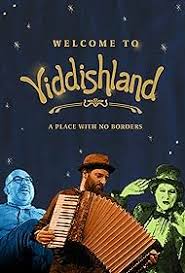
WELCOME TO YIDDISHLAND
Australia, 2024, 95 minutes, Colour.
Directed by Ros Horin.
2023-2024, especially with the Middle East conflicts, particularly Israel and Hamas, there is a greater need for social cohesion, and this has become significant in Australia, protests, signs and flags, the burning of the synagogue… And the official government appointment of mediators for anti-Semitism and he and anti-Islam.
One of the ways for this social cohesion is appreciation of the different cultures, their traditions, sharing in music, sharing enjoy.
And, this is what this film is trying to do. Especially with its provocative title and the reference to Yiddish. Which means that a non-Jewish audience has to check on what they know of the Yiddish language, a game of the Tongue. Many, and culture, used in Europe for 1000 years, during times of prosperity but, especially, times of oppression and persecution. (Maybe not an exact parallel but those of Irish extraction might remember the role of Gaelic in oppressed Ireland for so many centuries.)
Surprisingly, this is an Australian production, interviews with local actors, singers, composers, theatre directors, some will like Evelyn Krape and enjoyable reminiscences from Barry Kosky, but moving to countries all over the world. The emphasis is on the richness of the tradition, its significance, the popularity of the language (and its influence on English, and Age crossword testing its readers for an answer to a clue which could be schmuck or schlemiel), the development of music, the quality of song, rehearsals for a performance of Yentl in the Yiddish. These artists see themselves as Yiddishists.
The summary description of this film: A feature-length documentary about the progressive artists spearheading a global cultural renaissance of the endangered Yiddish language; by creating new art in an ancient language that speaks to our times.
For music lovers appreciative of a variety of cultures, this documentary will be welcome. Those interested in the traditions of Jewish and yet his culture, very informative. But, as has been indicated, in times like these, this kind of appreciation contributes to greater social cohesion.